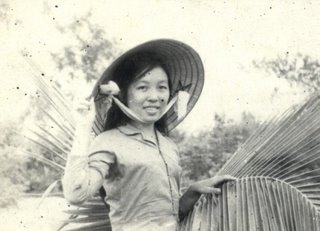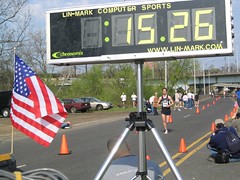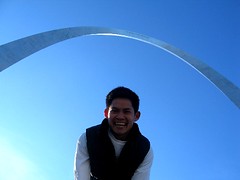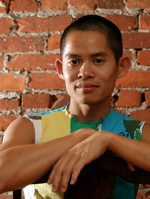I'm reading the doctor's diaries in Vienamese. A young woman's rediscovered war diaries are a publishing sensation 36 years after her death
A young woman's rediscovered war diaries are a publishing sensation 36 years after her deathJohn Aglionby in Hanoi
Sunday April 9, 2006
The ObserverFor three years until she was killed in a skirmish in 1970, Dang Thuy Tram struggled to cure the wounds of North Vietnamese soldiers injured fighting the Americans.Today she is healing wartime scars on both sides of the Pacific through her no-holds-barred diaries from the front line of the Vietnam war that have become a massive bestseller in her own country after languishing for decades in an American veteran's filing cabinet.
'It's the struggle in her mind,' said Thuy Tram's 82-year-old mother, Dang Ngoc Tram. 'For my daughter, and now for others, it was the honest reality of what she did and saw on the battlefield.'
The opening entry, dated 8 April 1968, is typical of the way she not only exposes what the authorities sought to suppress for years but also her inner turmoil: 'I had to do an appendix operation without enough medicine. Only a few tubes of Novocaine, but the wounded young soldier never cried out or yelled. He continued to smile to encourage me. Looking at the forced smile on his dry lips, knowing his fatigue, I felt so sorry for him. Very bad because his stomach is infected, but not from a burst appendix. I searched for an hour but couldn't find the cause ... I lightly stroked his hair. I would like to say to him, "Patients like you who I cannot cure cause me the most sorrow, and their memory will not fade".'
Vuong Tri Nhan, the diaries' publisher and a friend of Thuy Tram, agrees, but says it is much more than this contradiction of official propaganda that has resulted in Thuy Tram on Tuesday being awarded the Hero of the People's Army medal, an honour conferred on only a few thousand of the millions who fought.
'Her writing is so genuine because she was writing for herself, not for other people,' he said. 'It's a personal dialogue, a place to shelter her soul and her spirit.'
Robert Whitehurst, who is co-ordinating the translation into English, adds a third reason for the success. 'Hundreds of thousands of people on both sides have no word on what happened to their family members,' he told The Observer in Hanoi while on a research trip for his book, currently called Finding Thuy. 'This has been a way to understand. This is a person who has returned from the dead.'
The raw emotion is manifest in the diary, which served myriad purposes for Thuy Tram, just like a journal did for Anne Frank, to whom Thuy Tram is now regularly compared even though she was 27 when she died. At times it acts as an outlet for her anger against the Americans, particularly when friends are killed. 'I have already promised my comrades that even if it kills us we will try hard until we break the warlike head of this poisonous snake,' she wrote. 'How hateful it is! We are all humans, but some are so cruel as to want the blood of others to water their gold tree ... there is never enough to satisfy the avarice and crazy ambitions of those bloodthirsty demons.'
On other occasions this daughter of a surgeon father and academic mother who repeatedly admits to being a 'petite bourgeoise', vents her fury against her masters in the Communist Party. 'There are still worms and insects eating at the honour of the party; if I don't annihilate all those worms and insects they will destroy our love and belief in the party,' she wrote after her application to join was rejected.
When she was finally accepted into the fold, she realised that communism was not that wonderful. 'Just like a child who cries wanting his mother's milk until he is tired; when he finally gets the milk, it doesn't taste good anymore,' she writes.
Thuy Tram, who peppers her writing with literary references, from local works to Hugo's Les Miserables, often asks the diary for advice and at times her entries are the diary replying.
'This alternative personality is proving one of the biggest attractions of the diary,' Vuong said. 'In the war, these doctors had their own life, so they didn't open up. But they often didn't know what to do, so the diary was a way to [seek help].'
The scale of the success has taken everyone by surprise. 'Our print runs are usually 1,000 or 2,000 copies, but this has sold more than 400,000 in less than 12 months and is still selling fast,' said Vuong.
It has become such a phenomenon the government is trying to benefit from it. Prime minister Phan Van Khai wrote to a local newspaper extolling it: 'I felt very moved when I read the diaries a very special noble life and a very heroic and romantic one, filled by attraction to the human soul, as if it's whispering a message to the spirit.'
Meanwhile, the authorities in Quang Ngai province, where Thuy Tram was based, are building a clinic named after her and have launched a tour called 'Track down Dang Thuy Tram's Diary'.
As intriguing as the diaries themselves is how they came to be published. In December 1969, Robert Whitehurst's brother Fred, an intelligence officer in the US army who translated captured documents, was burning those that were considered redundant. 'My interpreter and friend Nguyen Trung Hieu stood behind me reading a small book. He said "Do not burn this one, Fred, it already has fire in it." As we sat in the evenings reading this "fire" I quickly realised I must return this diary to the family of the author. Six months later another diary came in in the same way from the field. Hieu told me that this was another diary from the same lady.'
More than two decades later Robert took over the job of translating and tracing the family. His search led to the Texas Tech University Vietnam archives. In March last year the brothers made two dozen copies and took them to a seminar run by the archive's centre. One recipient, Ted Englemann, immediately took one of the copies to Hanoi and found the family a month later.
'At first I didn't believe that it was true, but then I saw her writing and knew it was Thuy Tram,' her mother said. 'It took me 10 days to read. I had to stop every few paragraphs to cry.'
Robert Whitehurst expects the full English translation, complete with an introduction, to be published within a year, but his version (available at
archive.vietnam.ttu.edu/vietnamcenter/diary/index.htm) is already making an impression among American veterans.
'Officially the war is over and the nation is putting it behind them, but I've found there's a deep well of feeling,' he said. 'For example, one man said he wished he'd known Thuy Tram's story years ago because it would have helped him to get over his own post-traumatic stress disorder.'








